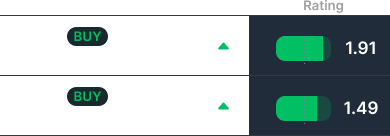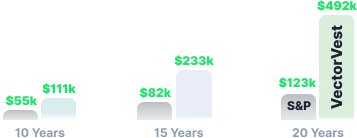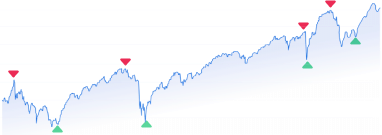While no one can predict with 100% certainty when a recession will hit, when enough economic indicators point towards an economic downturn, it’s prudent to employ the proper measures to safeguard your portfolio. Now, that doesn’t mean you’re always going to feel the same effects those before us did in the great depression – but it does mean you could be subject to short-term losses and should hedge or guard against them.
If you build a “recession-proof” portfolio, you can actually continue to make great returns during this period. Meanwhile, those who failed to prepare will feel as if the world around them is crumbling down. Which side would you rather be on?
In this article, we’re going to teach you how to invest in a recession safely. You’ll learn which investments do well during an economic downturn, and how you should adjust your portfolio accordingly. You’ll also learn some tips to help you protect your investments and mitigate the effects you feel from a recession. Let’s start by explaining what exactly classifies a recession – and just how worried you should be about the future.
What Classifies As A “Recession”?
A recession is typically defined as two consecutive quarters of negative economic growth. This can manifest in a variety of ways – declining housing prices, increased unemployment, and decreased consumer spending are a few indicators that things are going south.
In the past, we’ve seen recessions last anywhere from six months to two years. The most recent recession as of this writing lasted 18 months, beginning in December 2007 and ending in June 2009. It was the longest recession since World War II, and caused many people to lose their jobs, homes, and savings.
While we haven’t experienced a recession since 2009, that doesn’t mean one isn’t on the horizon. In fact, many experts believe we’re overdue for another downturn – especially considering how long the current expansion has lasted. The average expansion lasts just under four years, while we’re currently in our tenth year of expansion. That being said, the next recession could come at any time – and it’s important you’re prepared when it does.
Now that we know what a recession is and how it can affect us, let’s discuss if it’s actually a good idea to invest during one. After all, many people pull their money out of the stock market as soon as they hear the word “recession” – but is that really the smartest move?
Is It A Good Idea To Invest During A Recession?
The answer to this question may surprise you – but yes, investing during a recession can actually be a great idea! In fact, some of the best investments are made during economic downturns.
Think about it this way – when the economy is booming, everyone is making money. But when the economy takes a turn for the worse, not everyone will be as fortunate. This creates opportunities for investors to buy stocks at a discount. Then, when the economy eventually recovers (as it always does), those same assets will increase in value at a greater rate than normal – allowing you to make a huge profit.
Of course, there are certain risks that come along with investing during a recession and you have to know when to sell off or reduce your positions so that you can free up capital to take advantage of stocks trading at a discount. If all your capital is tied up in equities that have sustained substantial losses, this reduces your opportunity for gains on the rebound. But if you know how to mitigate those risks and time the market, you can actually come out ahead financially. Learn more about how a recession affects the stock market in our related blog post. In the next section, we’ll provide some tips on how to do just that.
How To Invest In A Recession: Tips For Investing During Market Downturn
Now that we’ve answered the question “should you invest in a recession?”, it’s time to provide some tips on how to actually do it. After all, there’s more to investing during an economic downturn than simply buying assets at a discount. You need to know how to protect your investments and ensure they’re positioned for long-term success.
Here are a few tips to help you do just that:
A Well Diversified Portfolio Is Less At Risk During Recession
One of the best ways to mitigate risk is by diversifying your portfolio. When you diversify, you’re essentially spreading your bets across different asset classes and industries. This way, if one sector fails, your entire portfolio doesn’t go down with it. This is good advice at any given time – not just during a recession. However, it’s more important when the economy is struggling and more and more businesses/industries show the effects of the recession.
The degree to which you diversify your portfolio will depend on your risk tolerance. Riskier investors may not diversify as much as more conservative investors.
Keep An Emergency Fund
You want to keep your capital working for you – even during a recession. However, it is worth keeping an emergency fund in a high-yield savings account. This is beneficial for two reasons: first and foremost, you have something to fall back on if the recession gets so bad that you lose a job. Secondly, though, an emergency fund means you won’t have to pull capital out of your investment portfolio. Lastly, an emergency fund provides liquid capital to invest in a downturn to take advantage of discounted stocks. You don’t want to interrupt your current investments – so keep a nest egg in a separate savings account.
Think Long Term & Avoid Panic Selling
When the stock market takes a turn for the worse, it’s easy to panic. But as an investor, you need to keep your cool. Do not let emotions take control. Instead,d rely on a sound trading plan. Set rules to follow that are free of emotion and provide objective clarity in decision making. Remember – focus on what you can control and ensure you have the best information at your fingertips to make the most informed decisions. That means you shouldn’t watch the market daily and let it stress you out. Stick to a plan! There is nothing you can do to prevent or correct a recession – all you can do is navigate to the best of your ability.
The best way to avoid panicking and selling all of your investments is by having a plan in place ahead of time. This way, you’ll know exactly what to do when the market starts tanking.
And speaking of planning ahead…
Have A Plan & Stick To It!
Recessions are inevitable – but that doesn’t mean they have to be scary. If you have a plan in place and stick to it, you can weather any economic storm. Just remember to diversify your portfolio, think long-term, and avoid panic selling. And if you’re not sure which types of investments do well in a recession, keep reading – we’ll share our top picks.
Know When to Sell
Now for the hardest part, knowing when to sell. 40% of investors cite, “knowing when to sell” as their biggest challenge. You’re sitting on lofty gains, feeling good about your investing prowess and then the market quickly reverses course. You think to yourself you should have sold when you had the chance but didn’t see it coming! Well, this is where a steadfast rules-based trading plan can help.
Having that plan in place and being able to remove the emotion of the panic sell makes it easy to kick greed to the curb. You draw a hard line in the sand in terms of the criteria you sell or reduce your positions. It saves investors a tremendous amount of money, and you will avoid self-judgment and regret. Further, as we noted above, it frees up capital to invest in opportunities the downturn has created.
What Investments Do Well In A Recession?
Now that we’ve gone over some tips for how to invest during a recession, let’s talk about what investments actually do well in a downturn. After all, not all assets are created equal – some will perform better than others when the economy takes a turn for the worse.
So, what should you invest in during a recession? Here are a few ideas:
Gold & Silver
Precious metals tend to do well during economic uncertainty. That’s because they’re seen as safe havens by investors. When the stock market is volatile, many people flock to gold and silver as a way to protect their money.
Bonds
Bonds are another asset that does well in a recession. That’s because they’re backed by the government, so they’re seen as being relatively safe. Additionally, when interest rates fall, bond prices usually increase. This makes them a great option for investors looking for stability during a recession.
Real Estate
Always wanted to own a home – or perhaps a few multi-family units? In 2022, prices are at an all-time high. This has prevented those who wish to own property from being able to. If the housing bubble pops in the future, this will be your best chance to live out the American dream and own real estate! Not only will prices drop, but chances are, mortgage rates will too.
Investing in real estate can be a great way to make money during a recession. That’s because people always need somewhere to live – even when the economy is struggling. Of course, you need to be careful with this one. Make sure you do your research and invest in areas that are likely to weather the economic storm. The last thing you want to do is put a huge down payment on a property that doesn’t appreciate – even after the market corrects.
Defensive stocks
Defensive stocks are those of companies that provide essential goods and services. Think utility companies, healthcare providers, and food manufacturers. These types of companies tend to do well during a recession because people still need their products – even when the economy is struggling. As an economic downturn approaches, you may consider closing your positions in emerging tech companies and moving this capital to more practical, defensive stocks.
Dividend stocks
Dividend stocks are a great option for investors looking for income during a recession. That’s because these stocks tend to be more stable than others. Volatility is not something you can avoid altogether, especially during a recession. However, these types of stocks tend to be less volatile than others – allowing you to enjoy some semblance of stability. Plus, they offer regular payouts. This can help you weather the storm during an economic downturn.
Value stocks
Value stocks are those that are currently undervalued by the market. This means they offer a great opportunity for investors looking to make money during a recession. As the economy slows down, value stocks usually go up.
You can find some incredible opportunities in these stocks as many investors close out their positions and prices plummet. Just be sure you’re buying at the bottom – not a false bottom! That’s where having proper stock forecasting software pays off – more on that later. We also have an article explaining what value investing is if you’d like to learn more about how to uncover these types of stocks.
ESG strategies
ESG investing is a type of responsible investing that focuses on environmental, social, and governance factors. These can be used to invest in companies that are doing well financially while also having a positive impact on the world. This type of investing has become increasingly popular in recent years, and it’s a great way to make money during a recession.
ETFs with short exposure
ETFs with short exposure are a great way to invest your capital during a recession. These funds bet against the market, which means they usually go up when the stock market goes down. This makes them a great tool for hedging your portfolio and protecting your investments during an economic downturn.
Avoid These Investments During A Recession:
Just as there are certain investments that are great for market downturns, there are some you should avoid during these periods of negative growth. While we love stock options in periods of positive economic growth, they can be a bit too risky during downturns. You’ll find it much more difficult to accurately predict how a stock price will rise/fall during these timeframes – so avoid them altogether.
You should also avoid investing in companies that have high debt during market downturns. These companies are more sensitive to high-interest rates – which may result during a recession. As such, the stock prices of these companies will fall during a recession. Now, this could present the opportunity for the company in question as a value stock – but you’ll have to time it correctly. You don’t want to be stuck holding the bag if a company is unable to recover.
Final Thoughts On How To Invest In A Recession
There you have it – you now know how to invest in a recession. There are a few things we want to summarize before we wrap up:
- A recession is going to hit the US in the future – it’s not a matter of if, it’s a matter of when
- This doesn’t mean you need to panic sell. While you may want to close some positions to build an emergency fund and allocate capital into safer investments, recessions can create a great opportunity for investors
- Stick with recession-proof investments like precious metals, real estate, dividend, defensive, or value stocks, ETFs, ESGs, bonds, etc.
If you create a plan going into a recession and can commit to it, you’ll come out on top – while everyone else is scrambling to stay afloat. And no matter what the current economic conditions are, you need to set yourself up for success as an investor with a reliable stock forecasting software like VectorVest.
Not only will this provide you invaluable insights into overall market sentiment – but it can also help you find great opportunities to invest in – regardless of how the market is moving. With this type of software, you can make a killing during a recession. It helps you eliminate any emotion or guesswork from your investments. You’ll be given a clear buy, sell, or hold recommendation for any given stock. If you want a sneak peek into how it works, get a free stock analysis today.
What you should do next…
- Get our latest blogs delivered right to your inbox, subscribe to our newsletter.
- The market moves fast! Get our most current evaluation of this stock with our FREE stock analysis tool.
- Looking for stock picks? Not sure if now is the right time to buy/sell? For a limited time, enjoy the full benefits of a 30-day subscription to VectorVest for only [offer_txt] (usually up to [saving_txt]/month) . Get access to our full list of screeners showcasing our top stock picks that tell you exactly what to buy, when to buy, and when to sell.












